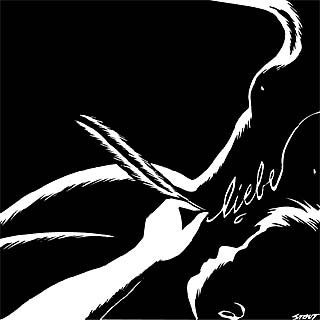Letters at 3AM
Four Meditations From a Novel in Progress
By Michael Ventura, Fri., July 12, 2002

FIRST MEDITATION: A language is not its words. A language is a topography, a landscape -- a forest, a desert, a lake; its words are the deer, wrens, salamanders, tigers, alive in its terrain. A language is the vision of a world -- you can say in French what you can't say in Hopi and you can say in Hopi what you can't say in French. None of the greatest philosophers wrote in English and no one speaking English has invented a world religion because English is not that kind of language -- it is at its most awkward in the terrain of the subtle and the mystic. People speaking modern English invented the Industrial Age and technology, or made the most efficient use of others' inventions. Use is the ideal enshrined in modern English -- use, and (in American English) a crude exaltation of speed expressed in the way Americans avoid syllables as they avoid nuance, tending to prefer words of one or two syllables and to truncate any syllabic name into one- or two-sound derivatives. Or we prefer abbreviations: DOA, ASAP, 24/7, FYI. (What is rebellion in our language? It's African-Americans inventing sweet multi-syllabic names never before heard -- a stance against the reductive culture that enslaved them.) Minimalist fiction, stories that progress swiftly and cleanly from one detail to another, nothing extraneous, no digressions ... is a fiction invented by Americans. Minimalism is literature imitating the ideal of business efficiency; it is literature feeling inferior to commerce and so imitating business practice in its form. How Shakespeare and Dickens, Tolstoy and Dostoevsky, Cervantes and Whitman, Poe and Rimbaud, would laugh, sadly laugh, at minimalism -- as sadly as Falstaff laughing at his lost Prince Hal.
Art is elemental language. Color and line: the language of painters. Movement and gesture: the language of dancers. Sound (and its ground, silence): the language of music. Shape: the language of sculpture. Behavior: the language of novelists, playwrights. Sequence: the language of cinema. The moment: the language of photography. Vision: the language of poetry -- as in Ovid: At this moment I'm prepared to tell how flesh is transformed/Into secret bodies. (Or different or multiple bodies -- depending on how the Latin grabs you).
Daily life is the language of surrender and assertion in ceaseless exchange.
Sex ... most elemental of all ... open to everyone, province of no one ... only sex has no equivalent and is purely the language of itself. Sex has no equivalent. Which is why Freud's intuition was correct in placing sexuality at the core of inner life. (That many of his digressions were mistaken does not diminish the worth of Freud's central idea.) Sexuality, the core of inner life, is a speechless language in which it is difficult, though not impossible, to lie -- however much we, employing spoken languages, lie about sex.
We are created to desire sex as much as we fear it and to fear sex as much as we desire it. Sex is an infinite spectrum of behavior that we reduce in English/American to one hissing syllable: sex -- the hiss of Eden's serpent, the flicking of its tongue, in one word, sex. Voice of the serpent. We are always about to be driven from the Garden, and we are always in the amazed state of realizing that the Garden is no longer home and will never again be home. Strange to fear what we lust for so much, and to lust so much for what we fear ... but that is the condition of sex ... stranger still when you know that for many people lust and fear (stripped of nuance) is all of sex. And out of this helpless vulnerability to lust and fear, our species procreates and proceeds through time -- which explains much about the human race.
But those for whom sex is an art, a language spoken (lived) at the level of art ... what is the medium of their art? Sensation. "Awareness due to stimulation of a sense organ," is the flash of metaphysics that even the practical Webster's dictionary is excited to say in its definition of sensation. Awareness and stimulation. Awareness through stimulation, stimulation through awareness. Each lover extending the possibility of the other. Possibility: the medium of sex. Sex is a language in which action partakes of dream, dream partakes of action. Dream and action ... in the throes of sex, who can distinguish them? Two people can be an orgy in that language, if it be truly spoken -- and when two people are their own orgy, that is the language of sex speaking in tongues ... a language that no longer comprehends itself but that nevertheless tells.
SECOND MEDITATION: Beauty is freedom at its most fevered. (Or is it the reverse?)
THIRD MEDITATION: We hurt each other enough simply by having honestly different needs.
FOURTH MEDITATION: And, yes, they said "I love you." They couldn't help it.
"I." Can anyone honestly be sure of the meaning of a word that means oneself? A word constantly seeking its own definition can never be said to have one, for it changes ever so slightly, moment to moment, as it seeks. "I," the word that is never quite the same each time it is said. Yet each time we say it as though it meant just what it did the last time; but something has been added to it, and something has been lost, since that last time. Yet we say "I" anyway, and with such arrogance, linking its meaning to some desire of who we'd like to be in a particular and quickly passing moment. So many words are, at their root, defined only by a shifting desire. "I."
"Love": a verb that's always falling apart and pulling itself together again, as both the subject and object of the verb shift and change while the verb attempts to calibrate and adjust. "Love": a noun forced constantly to absorb and to project not only its own meanings but the very purpose of our lives -- and even, often, the life of God, who is said to be love. "Love": a noun that is made to carry such immense weight cannot but help, in its liquid form, to shift and slide about under the pressure; and in its solid form it cannot help but crack. There's a play by John Cassavetes: The prisoner in the witness seat has murdered his wife; he is asked if he loved her and he asks back, "On which day?" On which day, indeed. Cassavetes' murderer knows that love is different every day and he is challenging the court not to be simplistic. "Love." The word defies finality as no other. But we say it anyway, we have to say it, we're always saying it. And because it's always present it's less a word than the name of an environment, in which we are pleased to be lost -- when we can be. Not a word but the testament of a desire to go beyond what we know, beyond ourselves, and to be accepted there, beyond the mere circumstances of our lives, for something we also do not know and cannot define: our truest selves, our deepest "I" -- if such a creature, indeed, exists. The word "love" is a box, Pandora's own, in which we put everything we think we were and everything we hope to be and everything the moment of saying will contain, and it bursts with all this as we say it, and we hear it burst but ignore the sound, as this strained and broken word spills over with all our irreconcilable selves, and we hope by a mere breath of speech to create its meaning anew in the present fleeing moment: "Love."
"You." Since no one can see fully into the depths of another, "you" is always as much a wish as a fact, always as much a fantasy as an experience, always as much a dream as a person. We just don't know. We say "you" as an act of faith, with the presumption that there's someone there at the end of the word "you" who will be recognizably the same, or at least consistent, in an hour, a week, a year. But the Other can't help but betray the "you" we say, because the Other can't help but change. A lover said: "Betrayal is not to do what you need to do in your deepest heart." We know the Other so well and not at all. "You" is a hope and a plea. Please be the "you" that I think you are for just long enough for me to be the "I" that I long to be. And, when that is sustainable for any length of time, we call that "love." And who's to say we're wrong? A lover said: "The quality of indelibility is what I think is continuous." The body of the other is unavoidable, and even, ultimately, almost knowable; but the "you" we address and the you that's actually there, they often meet only by chance. And on that chance we stake our lives. "You."
I love you is the sentence least susceptible to definition in any language. Yet, in every language, we say it and say it. I love you. I love you too. I love you so much. The crux of our lives is to have these words said to us, and to say them in turn. And so the crux of our lives revolves around the indefinable. ![]()








